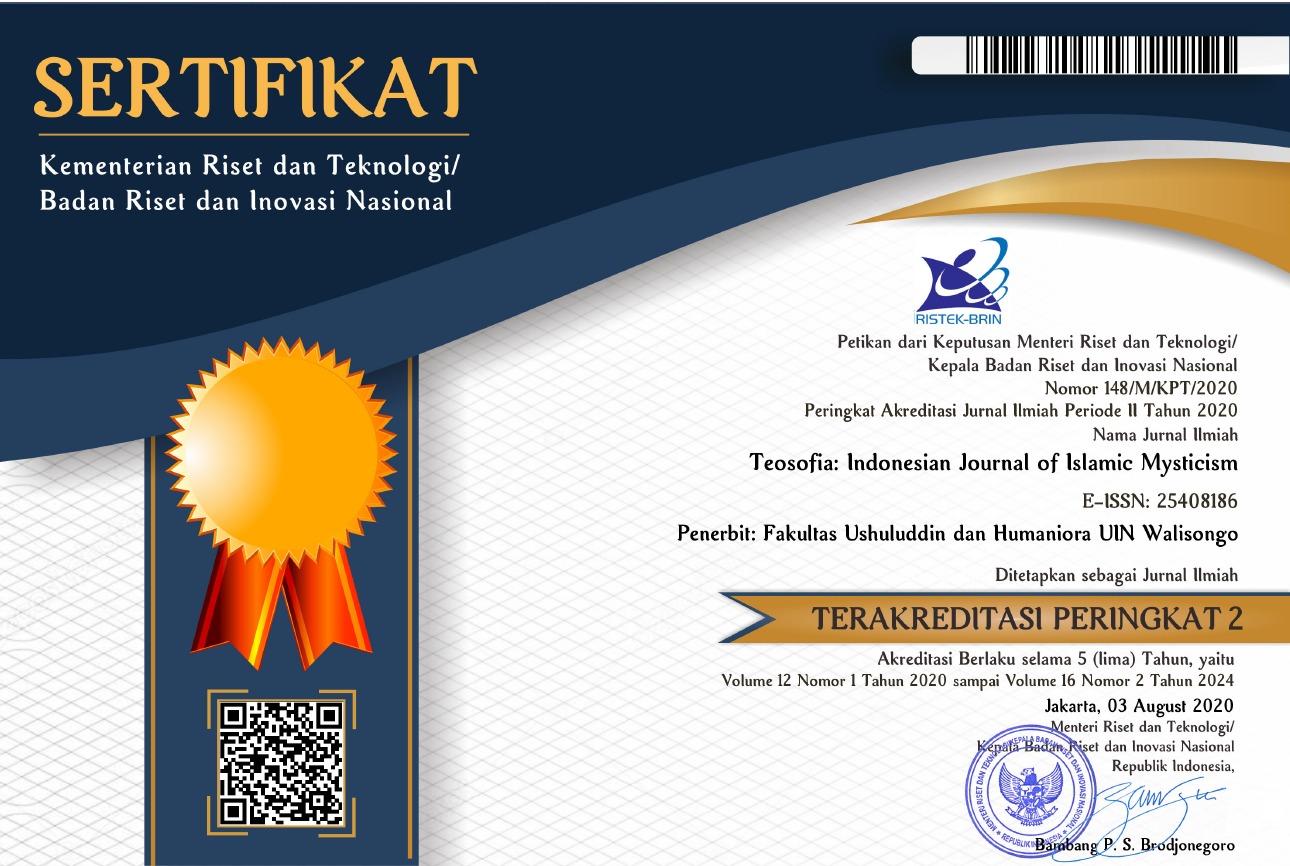ṬABAṬABA’I INTERPRETATION ON PROPHETIC MISSION IN TAFSIR AL-MIZAN FOR THE CONSTRUCTION OF NUSANTARA SPIRITUAL CIVILIZATION
DOI:
https://doi.org/10.21580/tos.v9i1.5328Keywords:
Spiritual Civillization, Prophetic Mission, al-Mizan, Thabatabai’s InterpretationAbstract
Modernism as the product of Renaissance has succeeded in couping the reality of God. The view of several western intellectuals have caused to the obscurity of human concepts which then affects to the meaning of the progress of human civilization, and further, presents serious problems almost in all social life. In the context of the archipelago (Nusantara), some Islamists groups try to establish a civilization based on materialistic point of view and with textual interpretation of the Qur'an. In fact, Islam in the archipelago genealogically has characteristics which are very spiritual so it is not appropriate to develop an advanced civilization in the archipelago based on materialist achievements as promoted by western modernism. The prophetic mission interpreted by Ṭabaṭaba’i in al-Mīzān fī Tafsīr al-Qur'an verses 1-2 and 5 gives the concept of spiritual civilization based on the Qur'an which is in line with the character of the archipelago. Thus, this study seeks to answer these research questions: first, how is the prophetic mission interpreted by Ṭabaṭaba’i in his Tafsīr al-Mīzān constructing spiritual civilization? Second, how is the construction of spiritual civilization in harmony and able to actualize the treasury of the archipelago? The method used in this study is a descriptive analysis with the approach of Ṭabaṭaba’i’s interpretation (Tafsīr) on the prophetic mission. The study finds that Ṭabaṭaba’i interpretation on the Surah al-Jumu’ah verses 1-2 and 5 gives the spiritual construction of civilization that is in line with the character of the archipelagoDownloads
References
Ahmad, Askar. “MISI PROPETIK PENDIDIKAN ISLAM: MEMBENTUK KARAKTER MENUJU TRANSFORMASI SOSIAL MEMBANGUN PERADABAN.” HUNAFA: Jurnal Studia Islamika 8, no. 1 (June 15, 2011): 175. https://doi.org/10.24239/jsi.v8i1.93.175-188.
Baedhowi. “Memaknai Kembali Spiritualitas Islam Dalam Peradaban Kontemporer.” Millah 3, no. 20 (2004): 221.
Borchert, Donald M. Encyclopedia of Philosophy. Edited by Donald M Borchert. New York: Thompson Gale Corporation, 2006.
Bunge, Mario M. Matter and Mind. Montreal: Springer, 2010.
Capra, Fritjof. The Web of Life. New York: An Anchor Book, 1996.
Cole-Turner, Ronald. Transhumanism and Transcendence. Washington DC: George Town University Press, 2011.
Coomaraswamy, Ananda K. The Essential Ananda K. Bloomington: World Wisdom, 2004.
———. What Is Civilization? United Kingdom: Lindisfarne Press, 1989.
Farooqui, Jamil. “Civilization In An Islamic Perspective.” Journal of Islam in Asia (E-ISSN: 2289-8077) 8 (February 2, 2012): 409–26. https://doi.org/10.31436/jia.v8i0.244.
Forshee, Jill. Culture and Customs of Indonesia. London: Greenwood Press, 2006.
Goff, Peter S, and Leaman Oliver. Islamic Philosophy A-Z. Edinburg: Edinburg University Press, 2007.
Hamim, Nur. “Pendidikan Akhlak: Komparasi Konsep Pendidikan Ibnu Miskawaih Dan Al-Ghazali.” Ulumuna 18, no. 1 (November 8, 2017): 21–40. https://doi.org/10.20414/ujis.v18i1.151.
Hashtroodi, Fatemeh Tayefeh Aghakhan. Concept of Chivalry (Futuwwah) According to Abd al-Razzaq Kashani: Analysis on His Tuhfah al-Ikhwan fī Khasāis al-Fityan. Kuala Lumpur, Malaysia, issued 2015.
Huff, Toby E. The Rise of Early Modern Science. New York: Cambridge University Press, 2003.
Irham, Iqbal, and Muhammad. Menghidupkan Spiritualitas Islam: Kajian Terhadap Konsep Hudur Ibn Al-Arabi. Jakarta: Semesta, 2016.
Khorsidi, Faridi, and Mona. “Comparing Mulla Sadra and Ibn Turka Viewpoints Regarding Angelic Inspiration.” J. Basic. Appl. Sci. Res 3, no. 2 (2013): 582.
Labib, Muhsin. Pemikiran Filsafat Ayatullah M.T Misbah Yazdi. Jakarta: Sadra Press, 2011.
Lufaefi, Lufaefi. “REKONSTRUKSI JARGON FORMALISASI SYARIAT: UPAYA MENJAGA PERSATUAN DALAM BINGKAI KEBERAGAMAN.” Al-A’raf : Jurnal Pemikiran Islam Dan Filsafat 14, no. 1 (June 27, 2017): 73. https://doi.org/10.22515/ajpif.v14i1.805.
Miftahusyaian, Moh. “SPIRITUALISASI KEILMUAN: Mengkonstruksi Peradaban Intelektual Muslim Abad Ke-21.” El-HARAKAH (TERAKREDITASI) l, no. arakah. Vol. 12. No. 1 (April 30, 2010): 17. https://doi.org/10.18860/el.v0i0.439.
Nasr, Seyyed Hossein. History of Islamic Philosophy. London: Routledge, 1996.
———. Knowledge and the Sacred. New York: State University of New York Press, 1989.
Nur Aziz, Afandi. “Spiritual Path of Grave Digger.” Teosofia: Indonesian Journal of Islamic Mysticism 7, no. 1 (2018).
Nur, Syaifan, and Dudung Abdurahman. “Sufism of Archipelago: History, Thought, and Movement.” ESENSIA: Jurnal Ilmu-Ilmu Ushuluddin 18, no. 2 (May 20, 2018): 123. https://doi.org/10.14421/esensia.v18i2.1476.
Pusat Bahasa Departemen Pendidikan Nasional. Kamus Besar Bahasa Indonesia (KBBI). Jakarta: Author, 2008.
Shirāzi, Sadr al-Muta’alihīn. Mazāhir Al-Ilāhiyyah Fī Asrar Al-Ulūm Al-Kamāliyyah. Tehran: Sadra Foundation of Islamic Philosophy, 1999.
———. Tafsir Al-Qur’ān Al-Karīm. Qum: Bidar Publisher, 1987.
Sīna, Abu Ali. Al-Isharāt Wa Al-Tanbihāt. Qum: Nashr al-Balaghah, 1996.
———. Al-Shifā. Qom: Ayatollah Mar’ashi Najafi Library, 1984.
Syihabuddin Umar Suhrawardi. Al-Awarif Al-Ma’arif. Kairo: Dar Al-Ma’arif, 1970.
Ṭabāṭabā’i, Muhammad Husein. Al-Mīzān Fī Tafsīr Al-Qur’ān. Vol. Vols. 19. Qum: Mansturat Jamīah Mudarrisin fī Hauzah Ilmiyah, 1997.
Tibi, Bassam. Islamism and Islam. London: Yale University Press, 2012.
Vasiltov, K. “Afdal Al-Din Kashani and His Treaties: The Book of Everlasting.” International Journal for Oriental Manuscript Research 10, no. 4 (2004): 10.
Wahid, Abd. “Al-Qur’ān Sumber Peradaban”. Ushuluddin” 18, no. 2 (2012): 111,122. https://doi.org/http://dx.doi.org/10.24014/jush.v18i2.703.
Downloads
Additional Files
Published
How to Cite
Issue
Section
License
Copyright
The copyright of the received article shall be assigned to the journal as the publisher of the journal. The intended copyright includes the right to publish the article in various forms (including reprints). The journal maintains the publishing rights to the published articles. Therefore, the author must submit a statement of the Copyright Transfer Agreement.*)
Licensing

This work is licensed under a Creative Commons Attribution-ShareAlike 4.0 International License.
In line with the license, authors are allowed to share and adapt the material. In addition, the material must be given appropriate credit, provided with a link to the license, and indicated if changes were made. If authors remix, transform or build upon the material, authors must distribute their contributions under the same license as the original.
_______
*) Authors whose articles are accepted for publication will receive confirmation via email and send a Copyright Transfer Agreement.









